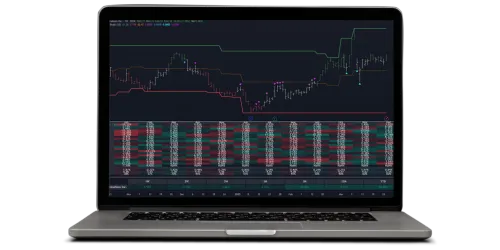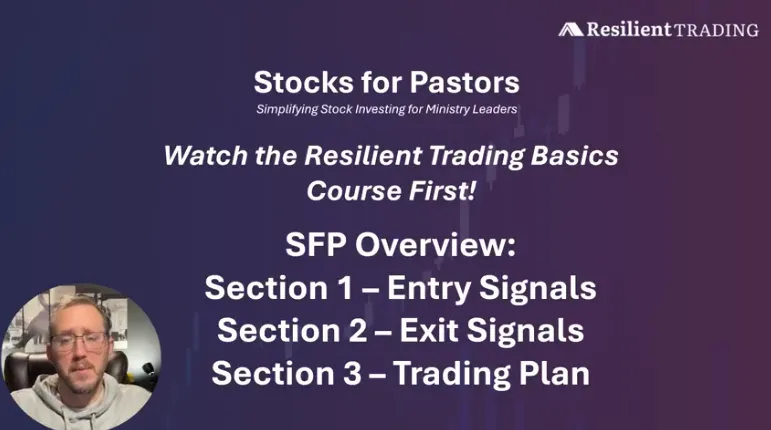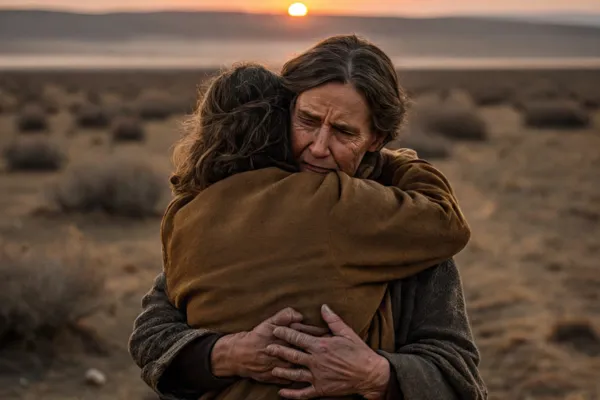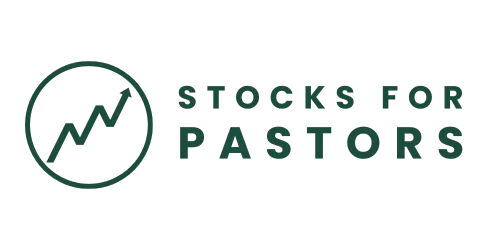Learn two beginner-friendly strategies, follow weekly alerts, and join a community that helps you see $100–$300/month potential without overwhelm.
Build the Skills to Trade Confidently and Create Steady Income

Let’s Talk About the Quiet Financial Pressure Most Pastors Carry
You’re not lazy. You’re not irresponsible.
You’ve just been so focused on helping others that your own financial future got pushed to the side. Maybe…
You’ve contributed to a retirement account here and there, but it’s nowhere near enough.
You’ve looked at the stock market before and thought, “I don’t have time to figure this out.”
You’ve wondered if you’ll have to keep working long after you want to stop, just to make ends meet.
You’ve even considered a second job or side hustle... but the thought of it wears you out.
You're not alone.
Thousands of pastors are in the same boat and they're quietly anxious about what the future holds.
But here's the truth:
You don’t need more time or more stress. You just need a smarter way to grow what you already have.
It’s a simple, proven investing system designed specifically for pastors who want to build wealth for the long haul; without financial stress, guesswork, or complicated strategies.

You don’t need a finance degree. You don’t need thousands of dollars.
All you need is a desire to take control of your future, and a guide who understands your world.
What You’ll Gain
Clarity on exactly when to enter and exit trades
Two proven strategies that fit into your schedule
Monthly watchlist of high-probability stock setups
Weekly trade alerts so you can follow along with confidence
Supportive community to keep you motivated and learning
Direct answers when you have questions
Why New Traders Succeed Faster in Foundations
Built by a pastor who understands the financial challenges ministry leaders face
Strategies tested and refined with years of real-world results
A step-by-step learning path that meets you where you are
A community that values wisdom, stewardship, and intentional growth

While nothing is guaranteed in trading and there is always a risk of losing, many members report seeing $100–$300/month potential within their first few months of joining. The real win is gaining the skills and confidence to make disciplined, repeatable trades.
PRICING
Choose Your Plan
Foundations
$97/mo
Beginner-friendly video course that walks you through every step
Monthly seasonal watchlist of high-probability stocks
Real-time trade alerts for SLM and MIS strategies
Access to member community
Downloadable checklists, templates, and guides
Up to 3 questions per month, responses within 48 hours
Seasonal Leverage Method course
Monthly Income Strategy course
Cash Flow Collective Course
Double Canopy Strategy Course
Monthly live group coaching calls
2 free months
1:1 onboarding video chat and initial coaching session

No contracts - cancel anytime
Income Accelerator
$197/mo
Beginner-friendly video course that walks you through every step
Monthly seasonal watchlist of high-probability stocks
Real-time trade alerts for all four strategies
Access to member community
Downloadable checklists, templates, and guides
Unlimited questions, priority same-day response
Seasonal Leverage Method course
Monthly Income Strategy course
Cash Flow Collective course
Double Canopy Strategy course
Monthly live group coaching calls
2 free months
1:1 onboarding video chat and initial coaching session

No contracts - cancel anytime
Get 2 Mo FREE
$1,970/yr
Beginner-friendly video course that walks you through every step
Monthly seasonal watchlist of high-probability stocks
Real-time trade alerts for all four strategies
Access to member community
Downloadable checklists, templates, and guides
Unlimited questions, priority same-day response
Seasonal Leverage Method course
Monthly Income Strategy course
Cash Flow Collective course
Double Canopy Strategy course
Monthly live group coaching calls
2 free months
1:1 onboarding video chat and initial coaching session

No contracts - cancel anytime
What Members are saying

“I never thought investing was something I could do, but this gave me confidence, clarity, and a clear path forward.”
Joel S.

“My account has nearly doubled in 18 months since I started with Stocks for Pastors.”
Eric B.

“Michael’s course has helped me see a clear path to advance my family financially. It is doable and attainable- exactly like he said it would be."
Dave C.
Start Building Your Trading Foundation Today
Learn two simple strategies, follow weekly trade alerts, and join a supportive community that helps you grow with confidence.
Read Our Latest Blogs
Lorem ipsum dolor sit amet, consectetur adipiscing elit.

Ruth’s Compassionate Leadership: A Model of Sacrificial Presence
The book of Ruth, just four short chapters, has become a blanket of comfort to me in recent years. Ruth was strong and steady, yes, but what strikes me most is how intentionally she chose to be present with Naomi from the very start.
In Ruth 1:1–18, we’re dropped straight into heartbreak. There’s no warm-up. The author rips the bandage off and places us in the middle of a grief-stricken conversation. Naomi is unraveling. “The Lord’s hand has turned against me!” she cries in verse 13. She is bitter, spiritually disoriented, and barely holding herself together.
We know Ruth is also recently widowed. Ten years of marriage brought her no children, no future, no security, and now even her relationship with Naomi is under threat. Ruth's own life is in ruins.
And yet, Ruth does something radical. She doesn’t center her own pain. She doesn’t say, “I’ve lost, too,” or “We’re both hurting.” She doesn’t correct, compare, or even commiserate. Instead, she chooses compassion over empathy. That choice changes everything.
Empathy would have said, “Me too.” It would have shifted the spotlight and made room for both women to sit side by side in sorrow, but without direction. That’s what Orpah does. She weeps, kisses Naomi, and turns back. But Ruth steps into something far more costly.
Before she ever speaks, she clings (v. 14). Action precedes words. And when Ruth finally does speak in her famous vow (vv. 16–17), notice what’s missing: there is no mention of her own grief. Every word is about Naomi. “Where you go, I will go… Your people… Your God… Where you die…” Ruth intentionally sets herself aside and aligns her future to Naomi’s pain.
This is not soft-hearted sympathy. It’s sacrificial solidarity.
Compassion costs something. It is not just a feeling; it’s a virtue. Empathy is a capacity, a God-given ability to understand another’s suffering, but compassion is a choice to act for someone’s good, even at great personal cost. Ruth left her homeland, her family, and her future for the unknown, simply to walk beside Naomi.
We live in a world that exalts empathy as a moral good in itself. But empathy, while necessary, is morally neutral. Even the most destructive people can be empathetic when it suits them. Compassion, by contrast, is always aligned with love and justice. It reflects the very character of God (Psalm 145:8), the heart of Christ’s ministry (Mark 6:34; Matthew 14:14), and our calling as believers (Colossians 3:12).
In Ruth 1, we see what this virtue looks like: a woman who chooses presence over performance, sacrifice over self-expression, and movement over mirroring. Ruth doesn’t match Naomi’s grief; she shoulders it. And in doing so, she gives Naomi something to hold onto—hope.
This is the kind of spiritual muscle we’re called to develop. Not to simply sit in puddles of pain with one another, comparing wounds, but to link arms, take each other’s hands, and pull forward. Not everyone will come with us. Ruth didn’t argue with Naomi. She simply resolved to stay. And when Naomi saw that Ruth was determined, “she stopped speaking to her” (v. 18).
Naomi was too numb to appreciate Ruth’s gift. Even after their journey, she returned to Bethlehem saying, “I came back empty,” while Ruth stood beside her, full of loyalty and love. But Ruth stayed. Not because Naomi could give her anything, but because compassion compelled her.
And because of Ruth’s choice in chapter 1, we get the redemptive ending in chapter 4.
For the Pastor’s Wife Who Loves the Naomi in the Pew
Pastor’s wife, you know this story well, not because you’ve studied it, but because you’ve lived it.
You’ve sat beside the Naomi who believes God has abandoned her. You’ve fielded the late-night texts, heard the sharp words born from pain, and stood quietly while someone grieved in a way that made your own loss feel invisible. You’ve carried burdens you didn’t cause and kept showing up when no one thanked you. Like Ruth, you’ve chosen the long road of compassion over the easier road of self-preservation.
Sometimes, you wonder if it’s worth it.
Let Ruth remind you: compassion is not always recognized in the moment, but it is never wasted. The fruit often grows in silence. Naomi couldn’t name Ruth’s love at the gate, but Ruth’s presence was the soil where redemption could take root.
You don’t need to match the grief of those you serve. You don’t need to fix it or carry it perfectly. You only need to stay close enough to walk with them out of it.
That’s your sacred calling: to be a steady, compassionate presence that helps others walk toward healing, even when they can't see it yet.
Keep going. The seeds you're planting today may not bloom until chapter 4, but they will bloom.


